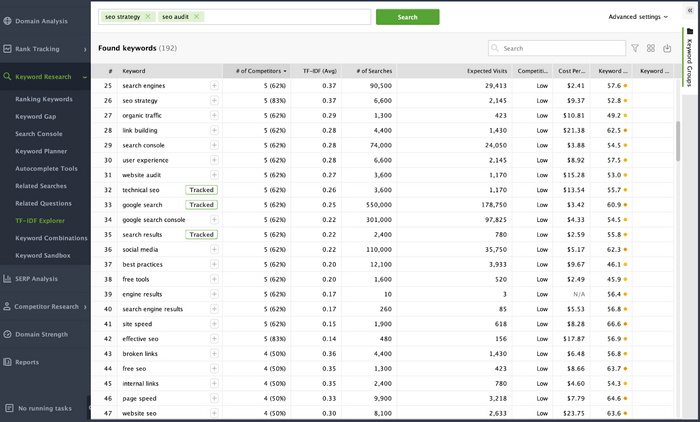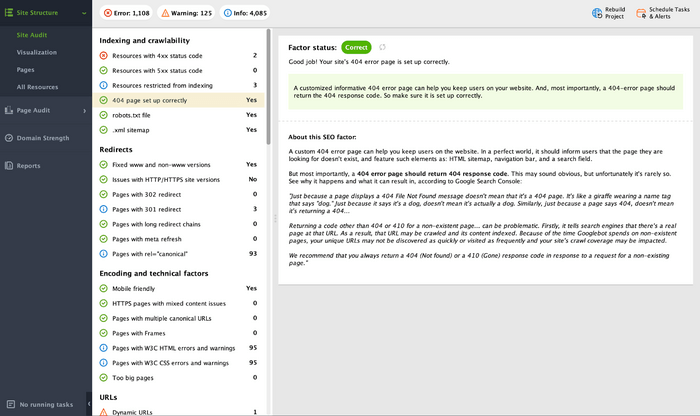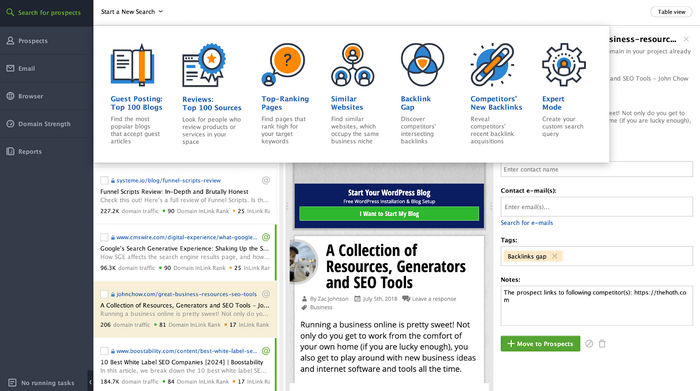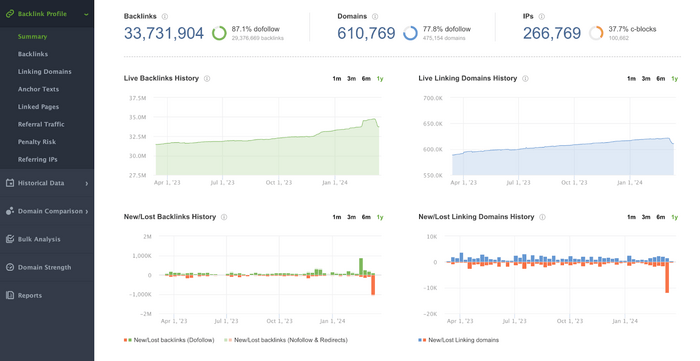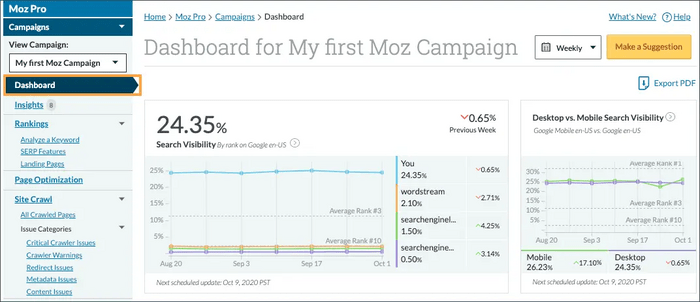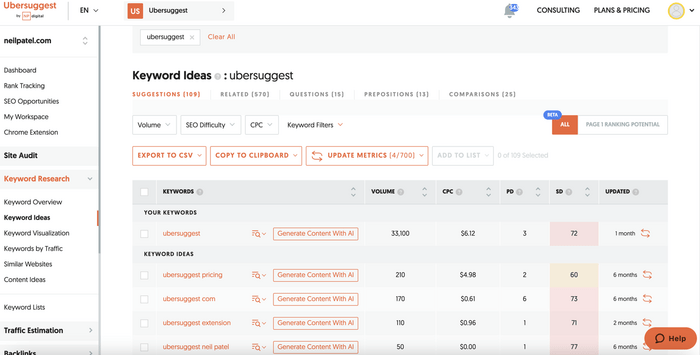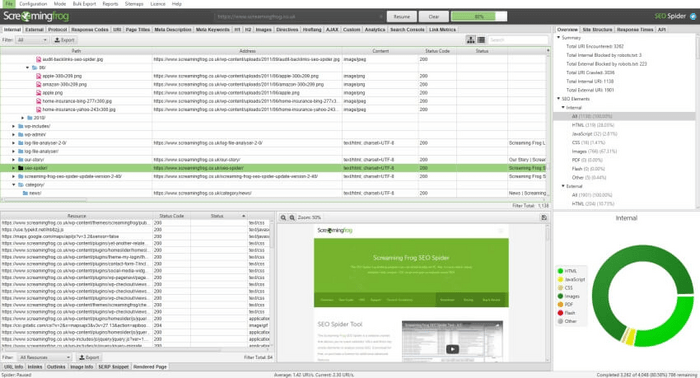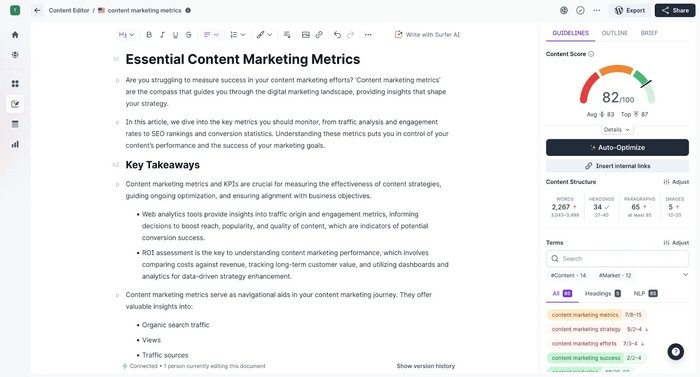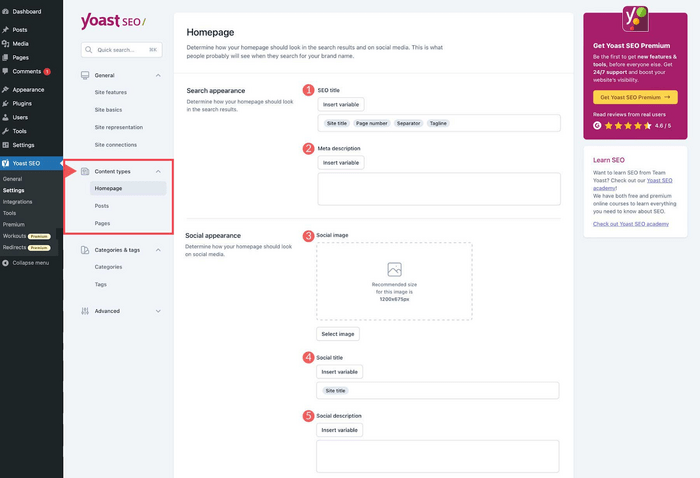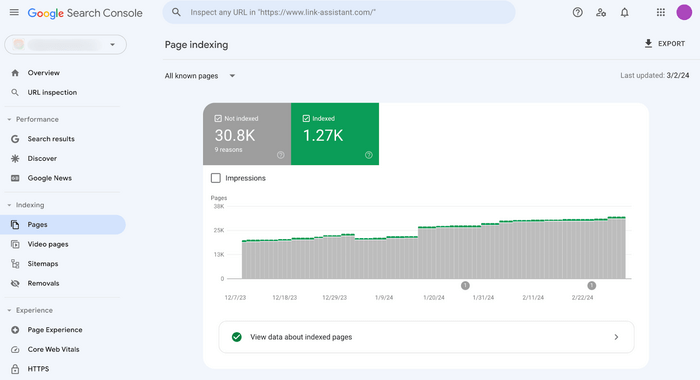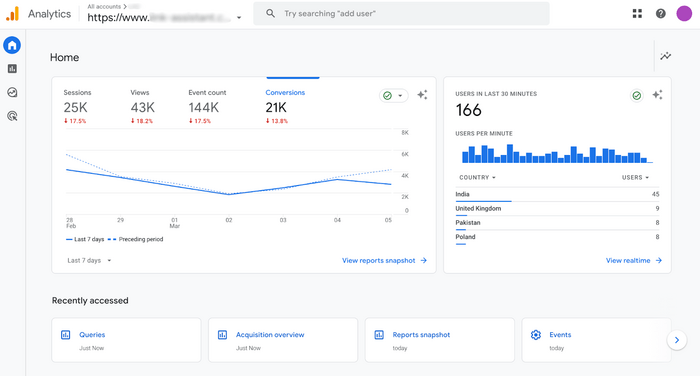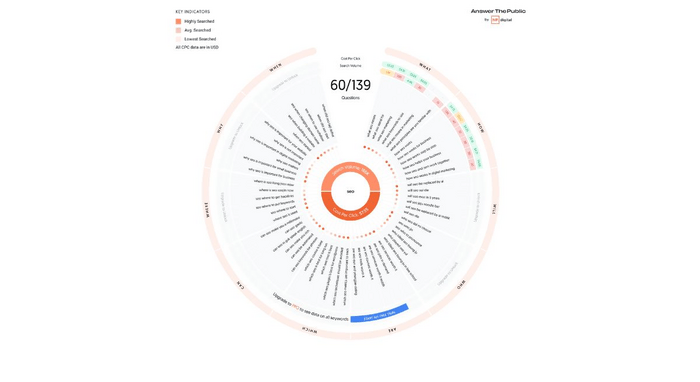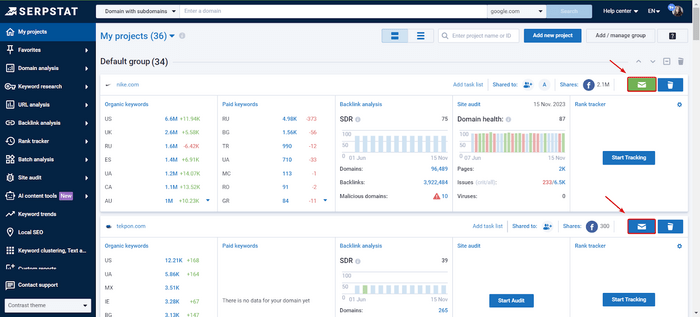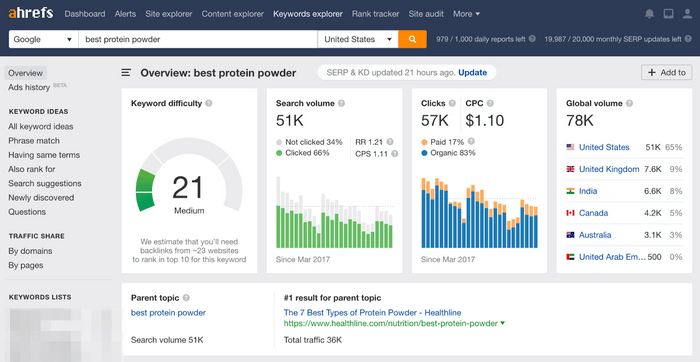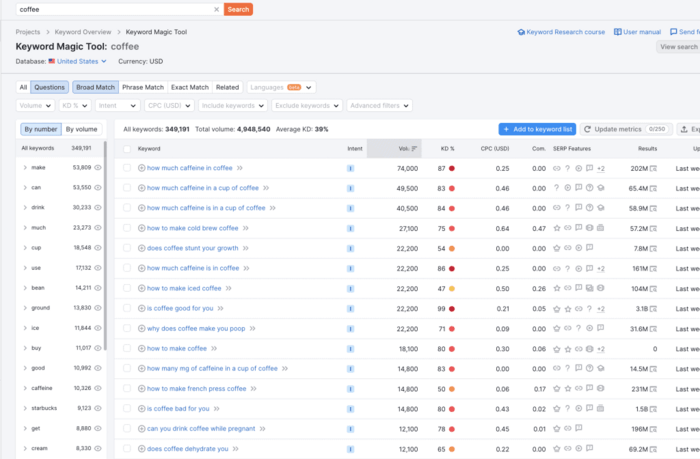Top 15 Best SEO Software for Small Businesses

Contents
- Why SEO matters for small businesses
- The real challenges small businesses face with SEO
- What to expect from this guide
- What to look for in SEO tools (before you commit)
- 15 Best SEO tools for small businesses
- 1. Rank Tracker – Best for monitoring keywords and local rankings
- 2. WebSite Auditor – Best for site health and technical SEO
- 3. LinkAssistant – Best for link building and outreach
- 4. SEO SpyGlass – Best for backlink analysis and competitor research
- 5. Moz Pro – Best for beginner-friendly, all-in-one SEO
- 6. Ubersuggest – Best for affordable SEO insights and content ideas
- Why small businesses love Ubersuggest:
- 7. Screaming Frog – Best for deep technical SEO audits
- 8. Surfer SEO – Best for content optimization that ranks
- 9. Yoast SEO – Best for WordPress on-page optimization
- 10. Google Search Console – Best free tool for performance tracking
- 11. Google Analytics 4 – Best for understanding user behavior and conversions
- 12. AnswerThePublic – Best for finding content ideas people actually search for
- 13. Serpstat – Best budget-friendly all-in-one SEO platform
- 14. Ahrefs – Best for backlink data and competitive analysis
- 15. SEMrush – Best for full-service SEO and digital marketing
- Comparison table: Best SEO tools for small businesses at a glance
- Choose the SEO tool that fits your business, not someone else’s
If you run a small business, you already know the internet’s noisy. Bigger brands dominate search results, outspend you on ads, and have teams tweaking SEO day and night. You? You’ve got maybe a couple of hours a week and a dozen tabs open trying to figure out what even works.
That’s why choosing the best SEO tools for small businesses isn’t about having all the features—it’s about having the right ones. Tools that save you time, show you what matters, and help you actually rank without draining your budget.
In this guide, you’ll find a handpicked list of SEO software built for small businesses. Whether you need to track rankings, audit your website, analyze backlinks, or find what your customers are Googling—you’ll find something here that fits. Some are free. Some are paid. All are worth your attention.
We didn’t just rely on tool websites or marketing hype—we also dug through over a dozen Reddit threads and real user discussions to figure out which tools people actually use and trust.
Let’s make SEO work for you—not the other way around.
Why SEO matters for small businesses
Over 90% of online experiences start with a search. If your business isn’t showing up, you're invisible to potential customers. SEO is what gets you seen—and not just by anyone, but by people who are already searching for what you offer.
Whether you’re a local service provider or an online retailer, ranking higher in search results means more traffic, more trust, and more sales.
The real challenges small businesses face with SEO
Let’s be honest—most small business owners aren’t sitting around wondering how to optimize their H1 tags. You’re running the show, wearing every hat, and trying to keep things moving. SEO? It’s important, but it often slips down the priority list. And even when you do try to tackle it, the tools can feel overwhelming or overpriced.
Here’s what’s really holding most small businesses back from winning with SEO
- Time. You’re juggling operations, sales, and customer service. SEO often takes a back seat.
- Budget. You can't drop $500/month on an all-in-one SEO platform just to use three features.
- Complexity. Between algorithm updates and technical jargon, it’s easy to feel stuck.
That’s why this list focuses on the best SEO software for small businesses—tools that are actually usable, affordable, and effective.
What to expect from this guide
We’ve curated 15 tools that cater specifically to small businesses—whether you’re just starting or scaling up. You’ll find a mix of:
- Free tools you can start using immediately
- Freemium platforms with generous features
- Affordable paid software that offers real ROI
Each tool in this list has been selected for its ability to solve real problems: improving rankings, fixing site issues, researching keywords, building backlinks, or tracking competitors. No fluff. No filler.
What to look for in SEO tools (before you commit)
If you’re a small business owner choosing SEO software, here’s what actually matters:
- Ease of use. You shouldn't need a marketing degree to understand what’s going on.
- Keyword research & tracking. Can you find the right search terms and monitor your rankings?
Site audit & technical SEO support. Does it flag crawl issues, broken links, or slow pages? - Backlink tools. Are you able to monitor your backlinks—or see what your competitors are doing?
- Competitor tracking. If someone’s ranking above you, you need to know why.
- Affordability. Flat monthly pricing or one-off licenses that won’t wreck your cash flow.
15 Best SEO tools for small businesses
Now that we’ve got that out of the way, let’s break down the top SEO tools worth your time and money:
- Rank Tracker – Best for monitoring keywords and local rankings
- WebSite Auditor – Best for site health and technical SEO
- LinkAssistant – Best for link building and outreach
- SEO SpyGlass – Best for backlink analysis and competitor research
- Moz Pro – Best for beginner-friendly, all-in-one SEO
- Ubersuggest – Best for affordable SEO insights and content ideas
- Screaming Frog – Best for deep technical SEO audits
- Surfer SEO – Best for content optimization that ranks
- Yoast SEO – Best for WordPress on-page optimization
- Google Search Console – Best free tool for performance tracking
- Google Analytics 4 – Best for understanding user behavior and conversions
- AnswerThePublic – Best for finding content ideas people actually search for
- Serpstat – Best budget-friendly all-in-one SEO platform
- Ahrefs – Best for backlink data and competitive analysis
- SEMrush – Best for full-service SEO and digital marketing
1. Rank Tracker – Best for monitoring keywords and local rankings
If SEO feels like a guessing game, Rank Tracker is the tool that turns that guesswork into strategy. Designed specifically to track how your website ranks for your target keywords over time, this is one of the best SEO tools for small businesses trying to stay visible in local and national search results.
You can monitor unlimited keywords (even in the free version), compare your performance to competitors, and analyze rankings across different search engines, locations, and devices. It’s built with small teams in mind—no fluff, just the data that matters.
Apart from rank tracking, the software offers 20+ keyword research tools.
Why small businesses love it:
- Tracks rankings for both local and global keywords
- Find thousands of keywords with 20+ keyword research tools
- Shows real-time changes in position across multiple search engines
- Pulls competitor ranking data so you can see who’s outranking you and why
- Easy integration with Google Search Console and Analytics
If you're trying to move from page five to page one without blowing your budget, Rank Tracker gives you the visibility to make smarter SEO decisions fast.
Ideal for: Keyword monitoring, local SEO, competitor tracking
Pricing: Free version available; paid plans start from $29.10/mo
2. WebSite Auditor – Best for site health and technical SEO
You can have the best content in your niche, but if your site loads like it’s on dial-up or Google can’t crawl it properly, you’re not going to rank. That’s where WebSite Auditor steps in.
It’s one of the most practical small business SEO tools out there—especially if you’re trying to fix what’s holding your site back. From uncovering broken links to flagging duplicate content and indexing issues, it gives you a full technical audit in plain English, not developer speak.
Unlike enterprise platforms that bury insights under layers of dashboards, WebSite Auditor lays it all out: what’s broken, why it matters, and how to fix it.
Why it’s great for small business SEO:
- Instantly scans your site for SEO issues like missing tags, slow speed, and crawl errors
- Offers actionable tips to improve page-level and site-wide optimization
- Helps you improve internal linking and website structure
- Built-in content analysis tool helps optimize existing pages for target keywords
For small business owners who want a healthier, faster, Google-friendly website without hiring a developer, WebSite Auditor is one of the smartest starting points.
Ideal for: Technical SEO, site audits, on-page optimization
Pricing: Free version available; paid plans start from $29.10/mo
3. LinkAssistant – Best for link building and outreach
If backlinks are one of the most powerful SEO ranking factors (they are), then building them should be a priority. But here’s the problem—most small businesses don’t have time to cold-email 50 bloggers a week or track link outreach in a messy spreadsheet. That’s exactly what LinkAssistant was built to fix.
This SEO tool helps small businesses manage the entire link-building process in one place. It finds backlink opportunities, organizes contacts, automates outreach emails, and tracks which sites link back to you. It’s efficient, clean, and saves you from wasting hours on link-building guesswork.
Why it works for small business SEO:
- Finds relevant link prospects based on your niche and location
- Offers customizable email templates to simplify outreach
- Keeps track of replies, status, and follow-ups in one dashboard
- Audits your existing links to flag low-quality or broken backlinks
If SEO for estate agents, cafes, consultants—or any small business—relies on local or niche authority, LinkAssistant helps you build that authority without the overwhelm.
Ideal for: Link building, local outreach, relationship management
Pricing: Included in the SEO PowerSuite bundle (with Rank Tracker, WebSite Auditor, SEO SpyGlass); paid plans start from $29.10/mo
4. SEO SpyGlass – Best for backlink analysis and competitor research
If you want to know why your competitors are outranking you, chances are it comes down to backlinks. SEO SpyGlass gives you a behind-the-scenes look at who’s linking to your competitors, how strong those links are, and where the gaps in your own strategy lie.
For small businesses, this is gold. You don’t need a million backlinks—you need the right ones. SpyGlass helps you find them.
It breaks down your backlink profile in plain terms: where links are coming from, which ones are helping (or hurting), and what kind of domains you should be targeting next. You can even audit your site for toxic backlinks that could be dragging you down without you realizing it.
Why small businesses rely on it:
- Reveals full backlink profiles for any domain (including competitors)
- Highlights high-authority domains you’re missing out on
- Identifies spammy or risky backlinks to disavow
- Offers clear SEO metrics like domain strength, penalty risk, and anchor text diversity
If you’ve ever wondered why your competitor ranks higher with less content, SEO SpyGlass probably has the answer.
Ideal for: Backlink auditing, competitor analysis, link-building strategy
Pricing: Free version available; paid plans start from $29.10/mo
5. Moz Pro – Best for beginner-friendly, all-in-one SEO
If you’re new to SEO but still want pro-level insights, Moz Pro is a safe place to start. It’s one of the most established SEO tools for small businesses—and for good reason. The interface is clean, the learning curve is manageable, and the data is easy to act on.
Moz Pro covers all the essentials: keyword research, site audits, rank tracking, and backlink analysis. But what sets it apart is its simplicity. You don’t need to be an SEO expert to make sense of your next move.
It’s especially useful for small business owners who want a dashboard that gives them a quick overview of what’s working, what’s broken, and what to prioritize.
Why it’s a top SEO tool for small businesses:
- Intuitive keyword explorer with SERP analysis and difficulty scores
- Weekly site audits that flag technical issues
- Tracks keyword rankings locally or nationally
- Link Explorer reveals backlinks, anchor text, and domain authority
Plus, Moz has one of the best knowledge bases in the industry. So if you’re learning as you go, you’ll always find practical advice.
Ideal for: Beginners, solo business owners, all-in-one SEO tracking
Pricing: 30-day free trial; paid plans start around $99/month
6. Ubersuggest – Best for affordable SEO insights and content ideas
If you're looking for an entry-level SEO tool that doesn’t skimp on features, Ubersuggest is one of the best small business SEO tools you’ll find. Created by Neil Patel, it’s designed to be accessible, affordable, and actually useful—especially if you're focused on content-driven SEO.
Ubersuggest offers keyword suggestions, content topic ideas, backlink data, and on-page SEO audits. It's perfect for small business owners who want to understand what their audience is searching for and how to create content that ranks.
What makes it unique is how it blends SEO data with content strategy. You can plug in a keyword and immediately see top-ranking content, traffic potential, and even word count averages.
This tool also popped up repeatedly in our research. We dug through over a dozen Reddit threads and SEO community posts, and Ubersuggest kept coming up as a go-to for beginners and budget-conscious business owners.
Why small businesses love Ubersuggest:
- Easy-to-use keyword research tool with SEO difficulty scores
- Generates blog and content ideas based on what’s trending
- Tracks keyword rankings over time
- Offers site audits and backlink tracking in one place
For small business owners who want to get more organic traffic through smarter content, Ubersuggest is a low-cost, high-value solution.
Ideal for: Content strategy, keyword research, on-page SEO
Pricing: Free plan with limited daily searches; paid plans start around $20/month
7. Screaming Frog – Best for deep technical SEO audits
Screaming Frog isn’t flashy—and that’s exactly why pros love it. It’s a desktop-based SEO crawler that gives you a detailed look at your website’s technical structure. For small businesses trying to fix underlying SEO issues that are hurting rankings, this tool is a beast.
You plug in your URL, and within minutes, Screaming Frog scans every page, flagging broken links, duplicate content, missing metadata, redirect chains, and more. It’s not the most beginner-friendly option on this list, but if you're willing to learn (or have someone on your team who’s a bit technical), it’s one of the most powerful SEO tools for small businesses—especially for the price.
Why small businesses trust it:
- Instantly crawls your site and highlights SEO issues
- Great for fixing broken internal links and duplicate pages
- Helps generate XML sitemaps and audit redirect paths
- Integrates with Google Analytics, Search Console, and PageSpeed Insights
Whether you’re launching a new website or cleaning up an old one, Screaming Frog gives you complete visibility into the technical stuff that’s often overlooked—but crucial for ranking.
Ideal for: Technical SEO, site audits, fixing crawl/index issues
Pricing: Free for up to 500 URLs; paid license is £199/year (~$259 USD)
8. Surfer SEO – Best for content optimization that ranks
Surfer SEO flips the script on how you write for search engines. Instead of guessing what Google wants, it shows you—based on data from the top-ranking pages for your target keyword.
This is one of the best SEO tools for small businesses that rely on content marketing. If you write blog posts, service pages, or landing pages and want them to actually rank, Surfer gives you a blueprint. It analyzes competitors' content, then scores yours in real time, showing you what to add, what to cut, and how to improve relevance.
Surfer isn’t just about keyword density—it factors in structure, length, headings, NLP terms, and internal links. The result? Content that’s built to rank, not just look good.
Why it’s a smart pick for small business SEO:
- Real-time content editor with keyword and structure guidance
- SERP analyzer breaks down what makes top-ranking pages succeed
- Audit tool finds quick wins for existing pages
- Integrates with Google Docs and WordPress for seamless writing workflows
If your content is stuck on page two—or never indexed at all—Surfer SEO helps you bridge the gap between what you publish and what ranks.
Ideal for: Content optimization, SEO writing, outranking competitors
Pricing: Paid plans start at $79/month (Basic); free Chrome extension available
9. Yoast SEO – Best for WordPress on-page optimization
If your website runs on WordPress, Yoast SEO is probably the first plugin you should install. It’s the go-to on-page SEO tool for small businesses who want to optimize their content without touching a line of code.
Yoast simplifies the essentials: editing meta titles and descriptions, generating sitemaps, managing redirects, and optimizing content for readability and keyword usage. It even gives real-time feedback as you write, so you know exactly where your page stands before hitting publish.
While it doesn’t cover everything (you’ll still need other tools for backlinks or technical audits), Yoast SEO is unmatched for making sure your pages are clean, structured, and search-ready.
Why it’s one of the best SEO tools for small businesses:
- Easily edit metadata, canonical tags, and structured data
- Real-time content analysis for focus keywords and readability
- Automatic XML sitemap generation
- Built-in breadcrumb support and social sharing controls
If you want to handle your site’s SEO from inside your WordPress dashboard—and avoid the overwhelm—Yoast keeps things simple and effective.
Ideal for: On-page SEO, metadata management, small business WordPress sites
Pricing: Free version available; premium starts at $99/year
10. Google Search Console – Best free tool for performance tracking
If you only use one SEO tool, make it Google Search Console. It’s free, incredibly powerful, and gives you direct insight into how Google sees your website.
For small businesses, this is your SEO command center. You can track which keywords are driving traffic, monitor clicks and impressions, identify crawl errors, and submit updated sitemaps. It’s also where Google will notify you if something’s broken—like indexing issues or mobile usability problems.
GSC won’t write content or build links, but it shows you where to focus your efforts. And since it comes straight from Google, the data is as reliable as it gets.
Why it’s essential for small business SEO:
- See exactly what queries bring users to your site
- Monitor click-through rates, rankings, and impressions
- Identify indexing issues and mobile performance problems
- Submit sitemaps and request re-indexing of updated pages
If you're not using Search Console yet, stop what you're doing and set it up. It’s the foundation every other SEO tool builds on.
Ideal for: Performance monitoring, keyword tracking, technical health
Pricing: 100% free
11. Google Analytics 4 – Best for understanding user behavior and conversions
SEO doesn’t end when someone lands on your site. You also need to know what they do next—and that’s where Google Analytics 4 (GA4) comes in. It tracks how visitors interact with your website: which pages they visit, how long they stay, what they click, and whether they convert.
For small businesses, GA4 helps answer the big questions: Are your blog posts driving sales? Which traffic sources bring in the best leads? Is your new service page actually working?
GA4 is more event-driven than its predecessor, giving you deeper insights into user actions, not just pageviews. When paired with Google Search Console, you get a full-picture view of how people find your site—and what happens after they arrive.
Why it’s one of the best SEO tools for small businesses:
- Tracks user journeys across pages and devices
- Shows which pages lead to conversions (and which ones lose traffic)
- Helps measure ROI on SEO, social, and email marketing
- Free to use, with powerful reporting and custom dashboards
If SEO gets visitors to your site, Google Analytics 4 helps you turn them into customers.
Ideal for: SEO performance analysis, traffic source insights, conversion tracking
Pricing: Free
12. AnswerThePublic – Best for finding content ideas people actually search for
Ever sit down to write a blog post and hit a wall? AnswerThePublic eliminates that problem. It takes a single keyword and turns it into dozens—sometimes hundreds—of real questions, comparisons, and phrases people are searching on Google.
For small businesses trying to build authority and attract organic traffic, this is one of the most creative SEO tools you can use. It’s especially useful for generating content ideas that align with what your potential customers are actually asking.
Whether you're a local accountant, dog groomer, or estate agent, this tool helps you speak your audience’s language.
Why it’s great for small business SEO:
- Reveals question-based, long-tail keywords you can target
- Visualizes content ideas in a super digestible format
- Helps you build helpful, relevant content that ranks
- Great for blog posts, FAQ pages, and service descriptions
If you're stuck on what to write—or want to rank for more than just generic terms—AnswerThePublic gives you the topics your audience already cares about.
Ideal for: Content ideation, long-tail keyword targeting, blog strategy
Pricing: Free version available with limited searches; Pro starts at $9/month
13. Serpstat – Best budget-friendly all-in-one SEO platform
Serpstat is one of those underrated SEO tools that punches well above its weight—especially when you're working with a limited budget. It offers a full suite of features including keyword research, site audits, backlink analysis, and rank tracking, all in a clean and beginner-friendly interface.
For small businesses that need an affordable alternative to giants like Ahrefs or SEMrush, Serpstat hits a sweet spot. It’s not as deep in every area, but it’s strong where it counts—especially in tracking keyword performance and uncovering SEO opportunities your competitors are missing.
Why small business users stick with it:
- All-in-one tool for tracking keywords, backlinks, and site health
- Competitor analysis shows what others are ranking for
- Keyword trends and clustering features help with content planning
- Flexible pricing makes it accessible even for micro-businesses
If you're looking for a no-nonsense platform that covers all the SEO bases without draining your budget, Serpstat delivers serious value.
Ideal for: All-in-one SEO management, keyword tracking, competitive research
Pricing: Free trial available; paid plans start at $59/month
14. Ahrefs – Best for backlink data and competitive analysis
Ahrefs is a heavyweight in the SEO world, and while it’s not the cheapest option, it’s one of the most powerful—especially when it comes to backlinks and competitor intelligence.
For small businesses that are ready to take their SEO to the next level, Ahrefs delivers unmatched depth. You can reverse-engineer your competitors’ strategies, audit your own backlink profile, explore keyword gaps, and find new content opportunities all in one dashboard.
Ahrefs is particularly strong for small agencies, ecommerce stores, or growing local businesses with a bit more SEO experience or budget to play with.
Why Ahrefs stands out:
- One of the most accurate backlink databases in the industry
- Shows exactly where competitors are getting their links—and how to get them too
- Keyword Explorer surfaces high-opportunity terms with clear difficulty metrics
- Site Audit tool reveals technical issues hurting your performance
If you’re investing seriously in your digital presence, Ahrefs gives you the data advantage that most small businesses just don’t have.
Ideal for: Advanced SEO, backlink strategy, competitive research
Pricing: Starts at $108/month; no free version, but lots of free learning resources
15. SEMrush – Best for full-service SEO and digital marketing
SEMrush is more than just an SEO tool—it’s a full-blown marketing platform. If your small business is growing and you're ready to go beyond basic SEO, SEMrush offers everything from keyword tracking to PPC analysis, social media tools, and even brand monitoring.
What makes it powerful is how seamlessly it ties all your marketing data together. You can track your rankings, audit your site, analyze competitors, research backlinks, plan content, and even schedule social posts—all under one roof.
It’s not the cheapest platform, but for small businesses that want an all-in-one growth toolkit, it’s hard to beat.
Why it’s among the best SEO tools for small businesses:
- Robust keyword and competitor tracking across SEO and PPC
- Site audit tool finds and explains technical issues
- SEO Writing Assistant helps you create optimized content
- Built-in tools for social media and content calendar planning
If you're ready to get serious about digital marketing as a whole—not just SEO—SEMrush helps you scale smarter, not harder.
Ideal for: Small agencies, growth-stage businesses, integrated marketing
Pricing: 7-day free trial; paid plans start at $117/month
Comparison table: Best SEO tools for small businesses at a glance
You’ve got the details—now here’s the cheat sheet. If you’re still weighing options, this table breaks down what each SEO tool offers so you can quickly compare features, pricing, and best use cases.
| Tool | Best For | Key Features | Free Plan | Starting Price |
|---|---|---|---|---|
| Rank Tracker | Keyword monitoring & local SEO | Unlimited keyword tracking, SERP analysis, competitor data | Yes | $29.10/mo |
| WebSite Auditor | Technical site audits | Crawl analysis, on-page optimization, internal linking | Yes | $29.10/mo |
| LinkAssistant | Link building & outreach | Prospecting, email templates, campaign tracking | Yes | $29.10/mo |
| SEO SpyGlass | Backlink auditing & research | Backlink profile, toxic link detection, competitor links | Yes | $29.10/mo |
| Moz Pro | Beginner-friendly all-in-one SEO | Keyword tracking, site audits, link explorer | No | $99/month |
| Ubersuggest | Affordable content-focused SEO | Keyword ideas, content suggestions, backlink data | Yes | $20/month |
| Screaming Frog | In-depth technical SEO | Crawl diagnostics, broken links, duplicate content | Yes (500 URLs) | ~$259/year |
| Surfer SEO | Content optimization | Real-time editor, content audits, SERP analyzer | No | $79/month |
| Yoast SEO | On-page SEO for WordPress | Metadata editor, readability checker, XML sitemaps | Yes | $99/year (Premium) |
| Google Search Console | SEO performance tracking | Keyword insights, index status, crawl errors | Yes | Free |
| Google Analytics 4 | Behavior & conversion tracking | Traffic sources, events, conversion flows | Yes | Free |
| AnswerThePublic | Content ideation | Long-tail keyword questions, trends, content ideas | Yes (limited) | $9/month |
| Serpstat | Budget all-in-one SEO | Keyword tracking, backlink data, site audit | Yes (limited) | $59/month |
| Ahrefs | Backlink data & keyword gaps | Deep backlink database, keyword research, audits | No | $108/month |
| SEMrush | Full-service SEO & marketing | SEO, PPC, social, content tools | Yes (trial) | $117/month |
Choose the SEO tool that fits your business, not someone else’s
There’s no one-size-fits-all SEO solution—especially if you’re running a small business. The best SEO tools for small businesses aren’t necessarily the biggest names or the most expensive platforms. They’re the ones that save you time, make your life easier, and help you get results without the fluff.
Whether you’re just getting started with local SEO, need to clean up your site’s technical issues, or want to scale your content strategy, there’s a tool on this list that’s built for your stage. Start with what solves your most immediate problem. You can always stack more tools as your business grows.
Most importantly: don’t overthink it. Pick one, take action, track your progress—and keep moving forward. That’s how small businesses win with SEO.


